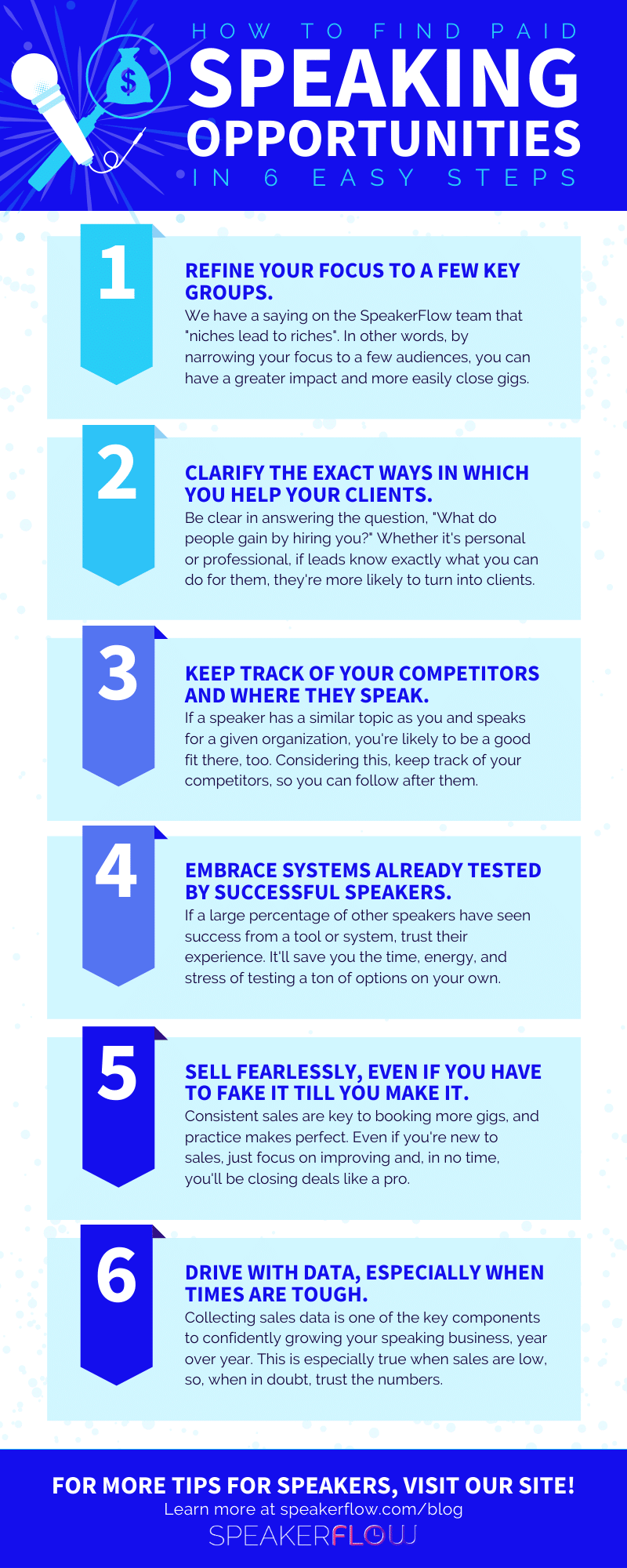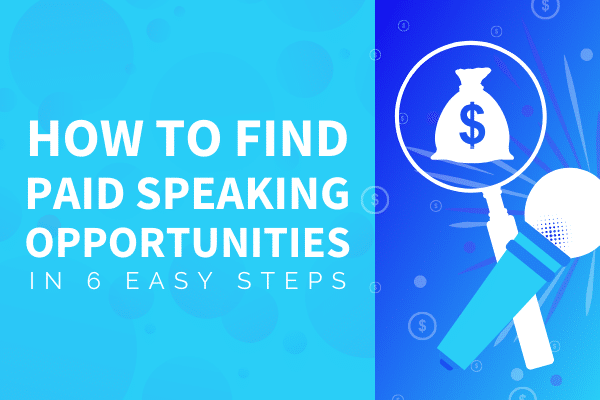When it comes to the speaking industry, there is a ton of advice out there, regarding how to best get started. Some speakers recommend focusing on your brand first, such as your website and speaking collateral. For others, it was easier to start with their presentation material and program details. That said, whatever you last heard cited as the “golden ticket” of speaking, there’s one recommendation that’s mentioned over and over: speaking for free. Admittedly, if you’re completely new to speaking and relatively unknown in your focus industry, finding paid speaking opportunities might not be immediately possible. However, within our own team, we tend to take the “It never hurts to try” approach and encourage the speakers we know to go for it.
In light of that, in this guide, let’s take a look at finding paid speaking opportunities. You might be asking, “How can I find them?,” “What technology is out there, to help me find them?,” or “Do I need to have sales experience to booked for paid gigs?”. No matter what your question or your level of speaking experience, rest assured we’ll tackle the most important info you need to get started.
Plus, if you’re still feeling lost at the end of this, no worries! Our team is always just an email or call away, and we’re all about free resources, especially if they help you get paid. 💰
- 1. Refine your focus to a few key groups.
- 2. Clarify the exact ways in which you help your clients.
- 3. Keep track of your competitors and where they speak.
- 4. Embrace systems already tested by successful speakers.
- 5. Sell fearlessly, even if you have to fake it till you make it.
- 6. Drive with data, especially when times are tough.
1. Refine your focus to a few key groups.
First, before anything else, make sure you’re not spreading yourself too thin. For many speakers, their first instinct is to reach out to as many businesses in as many industries as possible. In many cases, this is managed using automated email campaigns, so they don’t have to follow up with all of these leads manually. However, this method of sales, often called the “spray and pray” method, rarely yields results. After all, if you’re trying to create a message that suits everyone, you have to be vague. This makes it difficult for event organizers to know if you’re a good fit for their event and might even be confusing.
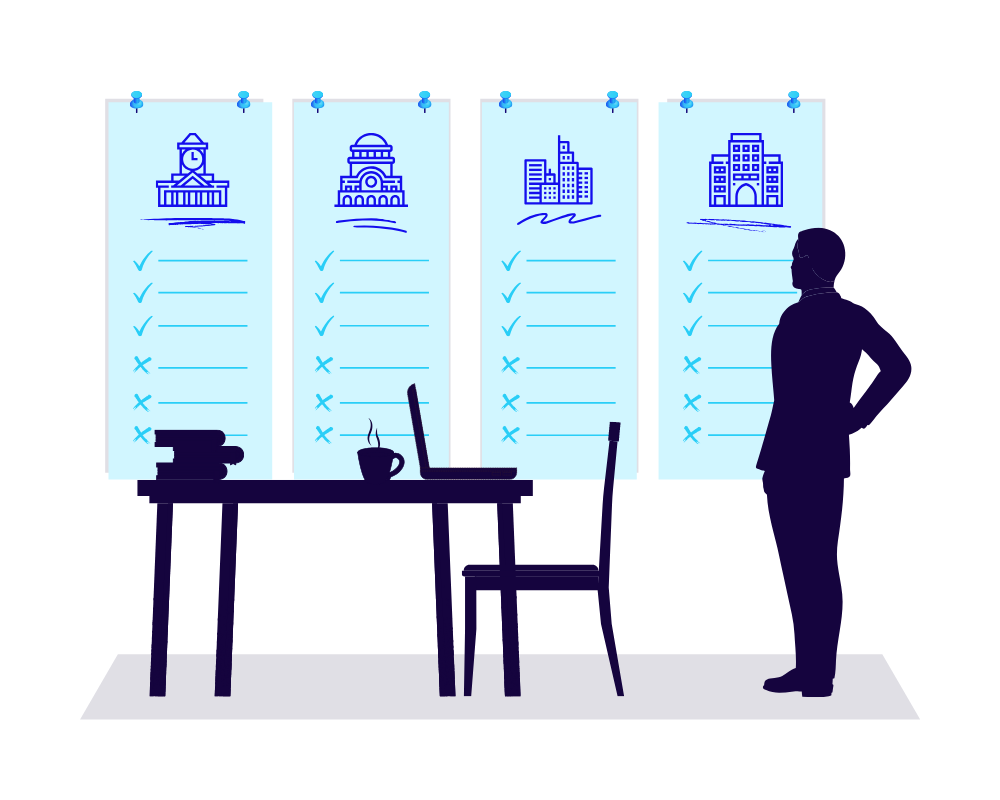
Essentially, selling as a speaker is like baking a cake. Some people are going to like chocolate cake, others will prefer vanilla, and still others will go for coffee, angel food, or devil’s food cake instead. You can’t combine all of these recipes, or you’ll end up with a flat and inedible cake. However, if you choose one flavor, at least some people will be satisfied. In the same way, you’re never going to be able to craft a message that applies to every audience. By tailoring your focus, presentations, and content to a select audience or a few industries, you’ll not only be able to more easily demonstrate your value, when paid speaking opportunities arise. You’ll also be more impactful on the day of the event, increasing the likelihood of repeat clients.
Whether you’re still relatively new or you’re an experienced speaker, a good way to start refining your focus is by looking at data. Based on your past sales, find out which departments or industries have booked you the most. Then, focus on those the next time you search for leads.
2. Clarify the exact ways in which you help your clients.
While you’re narrowing down who you serve, take some time to also define exactly how you serve them. Like choosing your ideal audience, a clear description about what you do for event organizers and their audiences can mean the difference between free and paid speaking opportunities. In other words, if you’re specific about the positive results your clients gain from hiring you, the more event organizers are likely to turn into clients.

Generally speaking, there are two primary ways to showcase the results of your work. First is your promise statement. This component of your sales process should be short, sweet, and eye-catching and only a few words long. For example, looking at speaker and sales expert, Kindra Hall, her promise statement is “Capture Attention, Close Sales, Increase Influence Through the Art of Strategic Storytelling”. As an event organizer, this shows you right away that if those are things you want, she’s the one to hire. Similarly, the second way to show results, her value proposition, states, “Kindra Hall helps individuals and companies capture attention, close more sales and blow up their brands through the fine art of strategic storytelling. Each presentation is a meta-learning experience with powerful research, engaging storytelling, and actionable strategies for measurable results.” In this way, it expands off of her promise statement to further demonstrate her value.
In summary, your promise statement and value proposition work together to gain the event organizer’s attention and bring them into a conversation. The former is a few words and is result-oriented. Conversely, the latter is usually several sentences long and explains who you are, who you serve, and what clients gain from your services. You can use both on your website, social profiles, and speaking collateral to reinforce your sales efforts.
3. Keep track of your competitors and where they speak.
Moving on, the third way to boost the number of paid speaking opportunities under your belt is to research your competitors. As far as speakers go, many of the standard rules of business competition don’t apply. If your focus is customer service, for example, other customer service speakers aren’t necessarily obstacles to your own success. In fact, they can be avenues for future bookings, as their past clients are likely a good fit for your presentations, too.

For example, if we search for “business performance speaker,” two of the top results are Ryan Estis and Michael Veltri. On Ryan’s website, see that his main focus is “preparing companies and individual contributors to embrace change and achieve breakthrough performance”. In short, he facilitates business transformation by empowering employees. Likewise, looking at Michael’s website, his mission is to “teach successful professionals better decision-making skills to achieve exponential leadership growth and business transformation”. It might sound a bit different, but, in essence, both of these men are focused on the same goal. As a result, a good number of Ryan’s past clients are likely a good fit for Michael’s services, when they are next hiring a speaker. Similarly, speakers with the same focus as you may be labeled as “competition,” but, in reality, they’re just an easy way to find qualified leads for your own speaking business.
If you’re unsure where to start, one convenient place to research other speakers is eSpeakers Marketplace. As a catalogue for event organizers, it lists speakers by topic, speaking fee, etc., so you can find speakers similar to you in no time. It also allows you to see what other speakers in your arena are charging. That way, when you’re looking for paid speaking opportunities, you can ensure you’re not selling yourself short.
4. Embrace systems already tested by successful speakers.
In addition to eSpeakers Marketplace, there are tons of tools out there for kick-starting your sales process. This brings me to the fourth step in finding paid speaking opportunities: trust technology that other speakers have already tested. Although every speaker is different, there are systems that have proven successful for speakers varying in experience and in expertise. Because of this, if you’re looking for sales tools to make your life easier, flex your network! Some of the best referrals come from speakers that have already been where you are and found a solution.
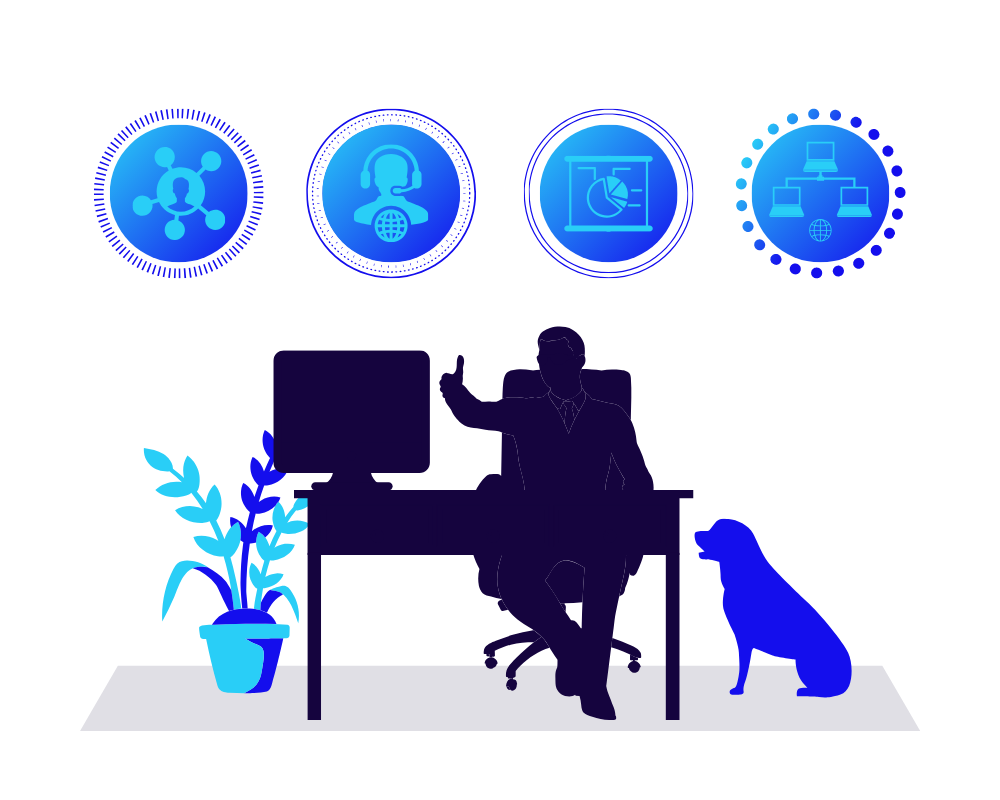
Recently, some of the most popular solutions haven’t even been speaker-specific systems. Focusing on sales, tools like Dialpad, Zapier, and Calendly can be a huge time-saver, especially when running your speaking business solo. In the case of these three, they’re also easy to integrate with your other tools. That way, if you already have technology in place that’s working well, you likely won’t have to switch anytime soon.
Additionally, if you’re looking for systems that are speaker-specific, you’re in the right place. Since we launched in 2019, SpeakerFlow’s promoted two systems built specifically for the speaking industry. The first of these, SpeakerFlow CRM, is all about organizing and optimizing your speaking business, so you can grow and scale. The second, the Intel Engine, is for finding paid speaking opportunities. Remember in the last section, when we covered competitor research? That’s what the Intel Engine is for. Want to search for upcoming events within a specific industry? It can do that, too. In short, for all that generic tools can be useful, there’s nothing like a system that was made with you in mind. After all, time is money, and no one knows that better than someone currently working for free. 🤷
5. Sell fearlessly, even if you have to fake it till you make it.
All of that said, besides technology, nothing can improve your sales more than sales practice. No matter how much advice or coaching you get, there’s no better teacher than experience. Within our own team, we see this time and time again with our clients. For many of them, the thought of sales is not only overwhelming, as they don’t know where to begin. It’s also nerve-wracking, as many of them have never been in a position that demanded sales techniques on a regular basis.
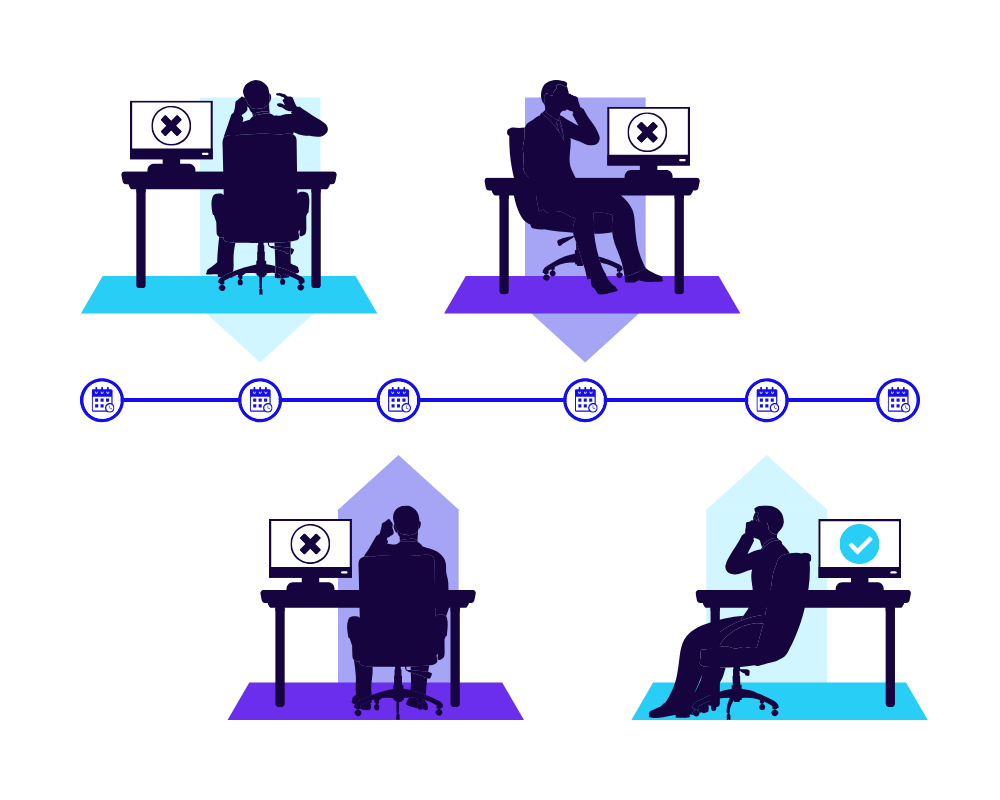
Personally, I know this first hand from one of my previous jobs. Although I originally started in a sales position, I had very little sales experience. As a result, although I had a great teacher, I had plenty of anxiety for the first few months of sales calls. I would trip over my words, draw a blank when asked a question I didn’t know, and basically just act as an example for anyone wondering what a terrified salesperson looks like. That said, despite these challenges, over time, I improved dramatically, and although it isn’t a part of my job currently, I still use many of the skills I learned when I was a saleswoman.
Likewise, even if you’re nervous when it comes to sales, remember that no one is an expert on the first day. Just like practicing your speaking programs, learning to sell with enough confidence to close paid speaking opportunities takes time. I also highly recommend checking out a TED Talk from Dr. Amy Cuddy, entitled “Your body language may shape who you are,” if you’re an introvert like me. It’s an amazing talk for many reasons, but it was one of my biggest sources of encouragement, when I was still learning to sell. Hopefully, it can help you, too.
6. Drive with data, especially when times are tough.
Finally, and arguably most importantly, finding paid speaking opportunities comes most easily when you drive with data. In the first section, we covered using data for narrowing your focus. However, keeping track of your sales metrics can be immensely helpful for a number of reasons. If you’re having a good month, you can see what you did differently and how it boosted your numbers. If times are tough, you can see what’s holding you back and where you can improve.
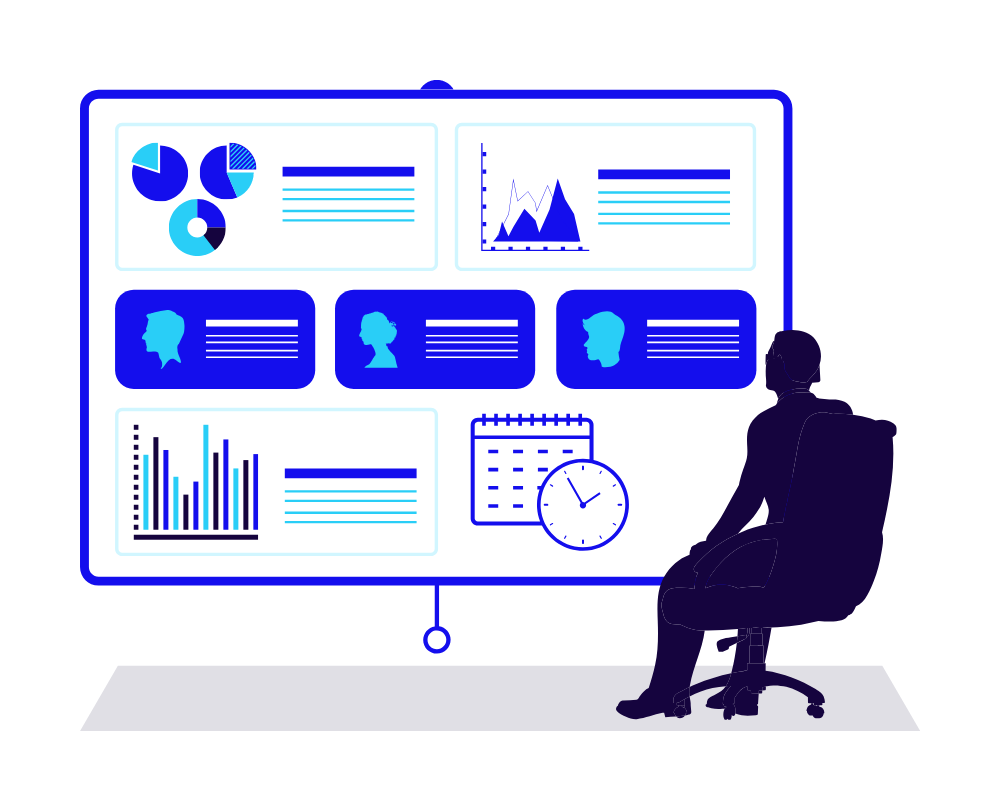
In short, information is power, whether you’re looking at sales, marketing, or any area of a speaking business. Because of that, the more apt you are to set sales goals, plan a detailed sales process, and execute on them, the more likely you are to be successful. It might be a lot of work, but you have to admit that success sounds like a pretty solid reward. 🙂
In the meantime, hopefully, this quick and easy guide gave you a starting point for finding paid speaking opportunities. For more information about selling, as a professional speaker, check out the following resources.
- “How To Get Speaking Gigs: The Ultimate Guide”
- “Want To Impress Every Event Planner You Meet? Read This.”
- “7 Steps To Take If You Want To Charge Higher Speaking Fees”
- “Where To Find Speaking Engagements: The Complete List”
Additionally, for more hands-on advice or recommendations, drop us a line! Between the six members of our team, we have decades of sales experience, and there’s nothing we like more than to share what we know.
